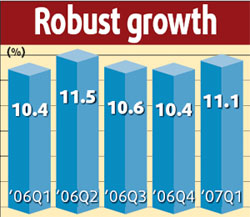| Home / Business / Energy | Tools: Save | Print | E-mail | Most Read | Comment |
| Time to Act on Energy |
| Adjust font size: |
A sober review of To meet the country's five-year goal of energy conservation and pollution reduction, the authorities should take stock of the lack of progress and rethink policies. Ma Kai, head of the National Development and Reform Commission, frankly admitted to the country's top advisory body on Wednesday that the country's high-speed economic growth has yet to be brought under control. At present, the inevitable consequence of the economic boom will be more consumption of energy and more emission of pollutants. Due to rapid industrial growth, especially in energy-guzzling sectors, the country's consumption of electricity increased a stunning 15.8 percent in the first five months of the year. This growth in use of power, the fastest in three years, has considerably outpaced the country's economic growth, adding to difficulties in fulfilling the country's goal to cut energy consumption per unit of GDP output by 20 percent between 2006 and 2010. As a large developing country, Clearly, the Chinese authorities understand the severe environmental consequences of red-hot economic growth. Ma, the minister in charge of economic planning, pinpointed local governments as a driving force behind rapid expansion of energy-intensive and heavily polluting industries. Under the current fiscal system, local governments have to rely on local investment and industrial growth for local revenues. The need for incentives for local governments to put energy conservation and environmental protection ahead of economic growth calls for the central government to reform the existing fiscal system. Admittedly, such major reform cannot be done overnight. However, given the immense danger of failing to meet the country's energy and environmental goals, it is necessary to implement reform as soon as possible. At the same time, market mechanisms to reflect the real cost of energy use and environmental degradation should be put into place quickly. All these efforts are needed for our economy, our resources and our nation's future. It is high time to act. (
|
| Tools: Save | Print | E-mail | Most Read |
| Comment |
 |
| Related Stories |
|
|
